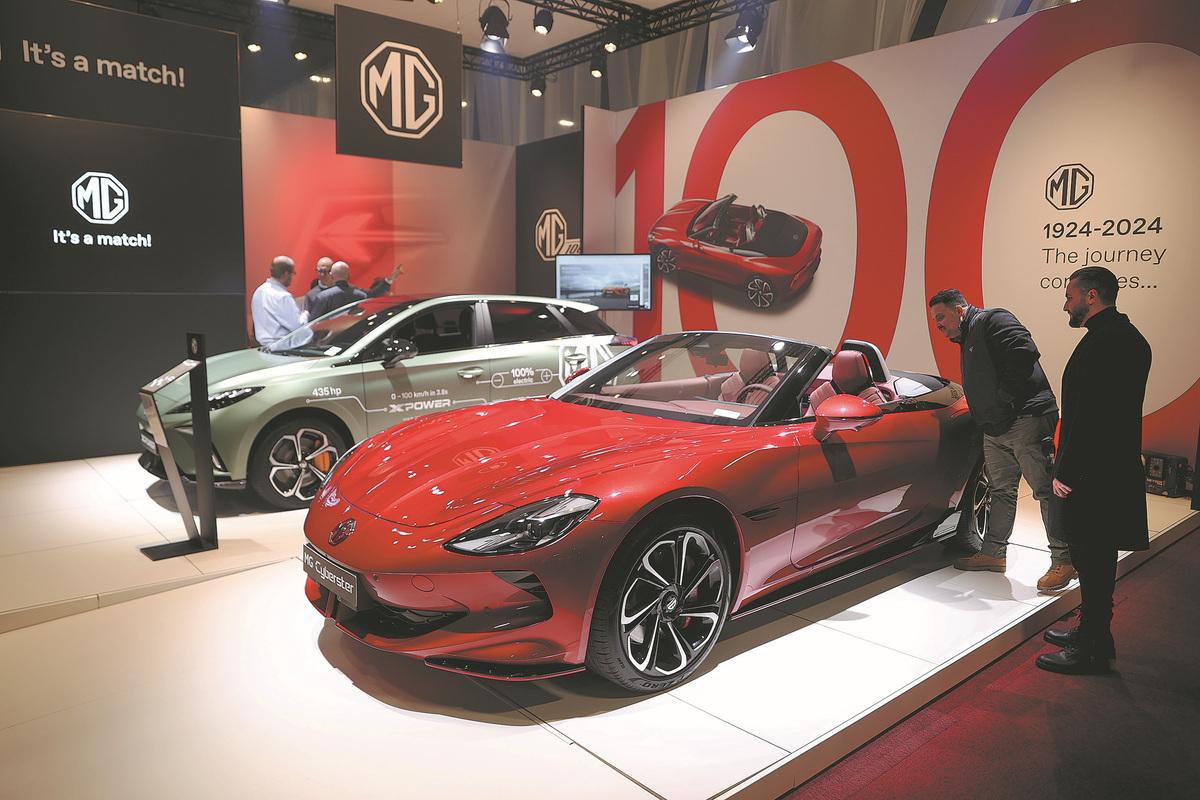
 0 Comment(s)
0 Comment(s) Print
Print E-mail China Daily, June 28, 2024
E-mail China Daily, June 28, 2024

Chinese new energy vehicles on display during an auto expo in Brussels earlier this year. [Photo/Xinhua]
China and the European Union are expediting consultations on the latter's anti-subsidy investigation into Chinese electric vehicles, and aim to reach a mutually acceptable solution by addressing the reasonable concerns of both sides, said China's Ministry of Commerce on Thursday.
As China and the EU agreed last week to start consultations, He Yadong, spokesman for the Commerce Ministry, said the essence of China-EU cooperation lies in complementary advantages and mutual benefits. Both sides have vast potential for collaboration in the field of green transition.
He said the EU is encouraged to work with China to expedite consultations, achieve positive progress and reach mutually acceptable solutions to prevent trade frictions from escalating, which could affect China-EU economic and trade relations.
Even though Chinese EVs account for just a small share of the EU's EV imports, the European Commission, which represents the interests of the EU as a whole, in mid-June unveiled additional provisional tariffs ranging from 17.4 percent to 38.1 percent for Chinese EV manufacturers despite widespread market concerns and China's objections.
Additional provisional EU duties of up to 38.1 percent on imported Chinese-made EVs are scheduled to take effect by July 4, with the tariffs expected to be finalized on Nov 2.
With some time remaining before the EU's final decision on imposing tariffs on Chinese EVs, government officials and business leaders said that initiating talks can be an effective approach to prevent further escalation and resolve differences.
During his meeting with Chinese Minister of Commerce Wang Wentao in Beijing on Wednesday, Wille Rydman, Finnish minister of economic affairs, said both the EU and China have successful experience in resolving trade and economic disputes, the Ministry of Commerce said in a statement released on Thursday.
Finland supports addressing differences through dialogue and consultation within the framework of World Trade Organization rules, said Rydman.
Cui Fan, a professor specializing in international trade at the University of International Business and Economics and director of research at the China Society for WTO Studies, said that globally, the development of new energy in various countries involves some level of policy intervention to address market imperfections.
Relying solely on market forces could take 20-30 years longer to develop the new energy industry, which is inconsistent with the pace of global green transformation. China's supportive policies in this sector are scientifically based and comply with WTO rules, said Cui.
Jin Ruiting, a researcher at the Chinese Academy of Macroeconomic Research under the National Development and Reform Commission, said currently the US still offers subsidies to support the construction of vehicle charging facilities within the country.
Peter Merker, director of the German Chamber of Commerce in China for Tianjin, said that sanctions as a tool have significant side effects.
Merker, who is also CEO of Schlote Tianjin, a subsidiary of German industrial parts manufacturer Schlote Group, said the automotive industry strongly opposes tariff increases and sanctions, and most ordinary people share that view.
China-EU trade declined 1.3 percent year-on-year to 2.23 trillion yuan ($307 billion) in the first five months, statistics from the General Administration of Customs showed.
The Ministry of Commerce also announced on Thursday that it will initiate an expiry review of the anti-dumping measures on imports of toluidine from the EU.Toluidine is a chemical used in the production of dyes, pharmaceuticals and pesticides.
In response to an application from the domestic toluidine industry, the ministry has decided to initiate this expiry review probe, effective from Friday, said the ministry in an online notice.
This investigation will commence on Friday and conclude by June 28, 2025.